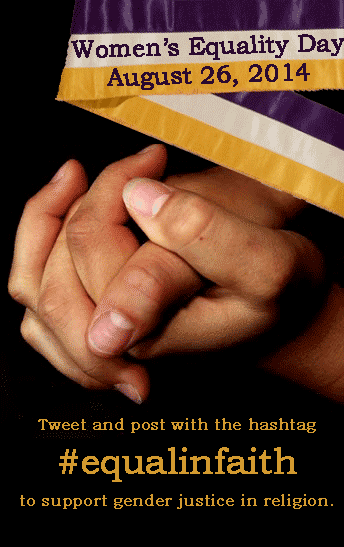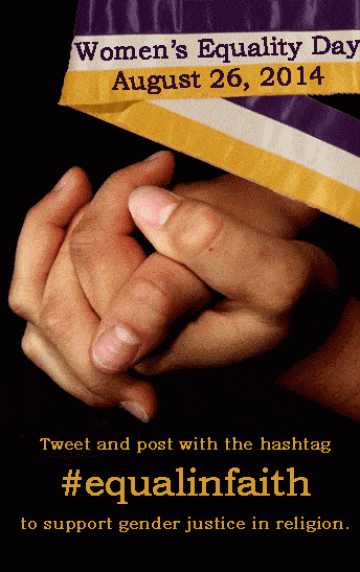 June 12, 1840
June 12, 1840
After crossing the ocean to attend the World Anti-Slavery Convention in London, Elizabeth Cady Stanton, Lucretia Mott and all other women were not permitted to participate. Instead, they were offered seats in the balcony behind a curtain. They could listen to the proceedings from where they sat, silenced and hidden from the men who were welcomed to the meeting, but their exclusion ignited a “burning indignation” in young Stanton. Later that day, Mott and Stanton “agreed to hold a woman’s rights convention on their return to America. …Thus a missionary work for the emancipation of woman…was then and there inaugurated.” Reference A, Reference B
Today, modern women in many societies enjoy the fruits of the labors of Stanton, Mott and others, who acted on their belief that women should be more than silent, hidden spectators when men convene about subjects of equal concern to men and women.
And yet…
April 5, 2014
“Since these subjects are of equal concern to men and to women, I am pleased that these proceedings are broadcast and published for all members of the Church,” said Elder Dallin H. Oaks of the Quorum of the Twelve Apostles of the Church of Jesus Christ of Latter-day Saints. Reference C He delivered these words to a male-only congregation as women stood outside the building in the rain, not permitted to enter. Reference D Women were not allowed to participate by praying, speaking or attending the session, but they were allowed to listen over the Internet, the curtained balcony of our era.

Listening to the priesthood session online was a new privilege for Mormon women. Only a year earlier, women were not even allowed to listen to the session from a metaphorical balcony. Reference E Inasmuch as a silent, hidden spectator role can be described as access, women now enjoy better access to the priesthood session of General Conference than to many other meetings of equal concern to Mormon men and women, such as bishopric meetings, high council meetings, stake presidency meetings, disciplinary councils, stake and regional priesthood leadership meetings, and meetings of the quorums of the Seventies, Apostles and First Presidency.
When these governing bodies meet, women may not even listen to the proceedings.
Being allowed to listen, but not participate, was not enough for Stanton and Mott. Is it enough for women today?
Reference A Sally G. McMillan. 2008. Seneca Falls and the Origins of the Women’s Rights Movement: Oxford University Press.






12 Responses
To learn more about the equal in faith even coming up this Tuesday: http://ordainwomen.org/equal-in-faith/
And if you live in SLC, you can participate in-person, in addition to the hashtag campaign: https://www.facebook.com/events/1471466246442077/
I’m interested in hearing more about this topic.
[…] “Since these subjects are of equal concern to men and to women, I am pleased that these proceedings are broadcast and published for all members of the Church,” said Elder Dallin H. Oaks of the Quorum of the Twelve Apostles of the Church of Jesus Christ of Latter-day …read more […]
Comment
As I was going to say…thanks, April, for continuing to show us the sharp inequality that persists 175 years after Stanton, Mott, and many of our own pioneer progenitors began to stand up against it. Listening without participating–how passive we continue to be.
This is so important. When will the announcement come out about Kate Kelly’s new church that follows her modern revelations?
As you have probably already been informed, Kate has no plans to start a church nor has she claimed to have revelations.
Brilliant, as always, April.
In my own sphere, I am attending a ward where a large number of families attend without one parent or partner, more often than not, it is the woman who no longer attends, or when the woman attends, she is married to a non-member. I get the feeling that as a church, we are tired of the discussion of how marginalized women are… and perhaps we are like the Amish, who lose a large number of church members, but bear enough offspring that still there is enough to maintain the population… but it seems to me that everyone- EVERYONE — is hurting as a result of the confusing place of women in the church. Confusion is not of God. Time is well overdue to open the curtains.
Yep. It is that simple. Women are still kept out and hidden. Such a clever and accurate comparison.
I really like the insight of this post.
To me, being allowed to physically attend the priesthood session is very unimportant. I have to listen to men in church talk and provide guidance all the time. I am happy to be excluded from this session. I would like to attend it and will fight to attend it when they start putting female speakers in it. When the men who hold the priesthood start seeing that they can actually be taught by women on issues relevant to the priesthood, that is when I would like to be present because to me, that is when the real change would have happened.
It is not the exclusion in participating in meetings that is the problem. It is a symptom of the disease we have in our community – of not being at ease with the female presence whether divine or not. When a wider audience is given to the women, then everyone will be more at ease to have them as counselors, mentors, teachers and priestesses.
[…] in Faith is sponsoring an interfaith event to promote gender equality in religion. This will be an informal affair focused on creating connections between people of various faiths, […]
[…] giving women in locations with Internet access the opportunity to hear the news directly but also maintaining a symbolic statement about the lower status of women by banning them from the room. There are no LDS meetings for women with similar restrictions […]